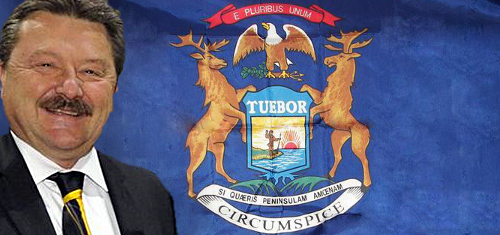 Michigan politicians have introduced new online poker and casino legislation, nearly five years to the day that federal authorities brought down the ban-hammer on US-facing online poker companies.
Michigan politicians have introduced new online poker and casino legislation, nearly five years to the day that federal authorities brought down the ban-hammer on US-facing online poker companies.
On Thursday, five Michigan state senators, led by Sen. Mike Kowall (pictured), introduced SB 889, aka the Lawful Internet Gaming Act. The bill seeks to “protect residents of this state who wager on games of chance and skill through the internet and to capture revenues and create jobs generated from internet gaming.”
The list of legally permitted online games has yet to be fully fleshed out, but sports betting won’t be among them in order to avoid conflicts with the federal PASPA sports betting prohibition. Online gambling would be limited to individuals 21 years of age or older.
The state plans to issue no more than eight online gambling licenses to either state-licensed private casino operators or federally recognized tribes with existing casino operations in the state. Tribes will have to waive their sovereign immunity and pay the relevant taxes and fees in order to qualify. Institutional investors who hold less than 30% of an applicant’s equity are exempt from the application consideration process.
Online gambling licenses will cost $5m upfront, although this will serve as a deposit against future online gambling taxes, which will be imposed at a rate of 10% of gross gaming revenue, payable monthly. Licenses will be valid for five-year terms, with five-year renewal options, and applicants must submit a non-refundable fee of $100k.
Online gambling technology vendor licenses are also good for five-year terms, but the specifics of who might qualify for a vendor license have yet to be nailed down. The legislation makes no reference to any so-called ‘bad actor’ prohibitions on companies that may have done some US-facing business when such activity was considered legally sketchy.
The bill would allow the state to enter into agreements with not just other US states but also “foreign entities” to allow “multijurisdiction internet gaming to the extent consistent with state and federal laws and the laws of any foreign jurisdiction.”
This includes allowing wagers from individuals not physically present in Michigan, which presumably allows for the possibility of Michigan residents being able to access gambling sites based in other countries with which the state has entered into reciprocal agreements.
Michigan pols already have some experience with online gambling, as Michigan is one of only three US states that allows some form of online lottery sales, and Michigan is one of only two states that permits instant win online games. This hasn’t sat well with some tribal gaming operators, who claim that the online lottery violates tribal-state gaming compacts.






